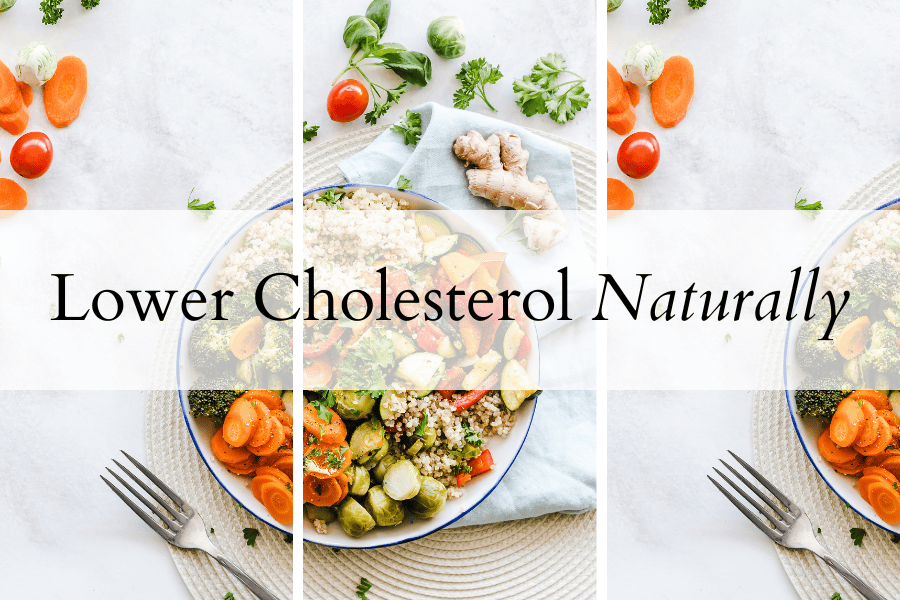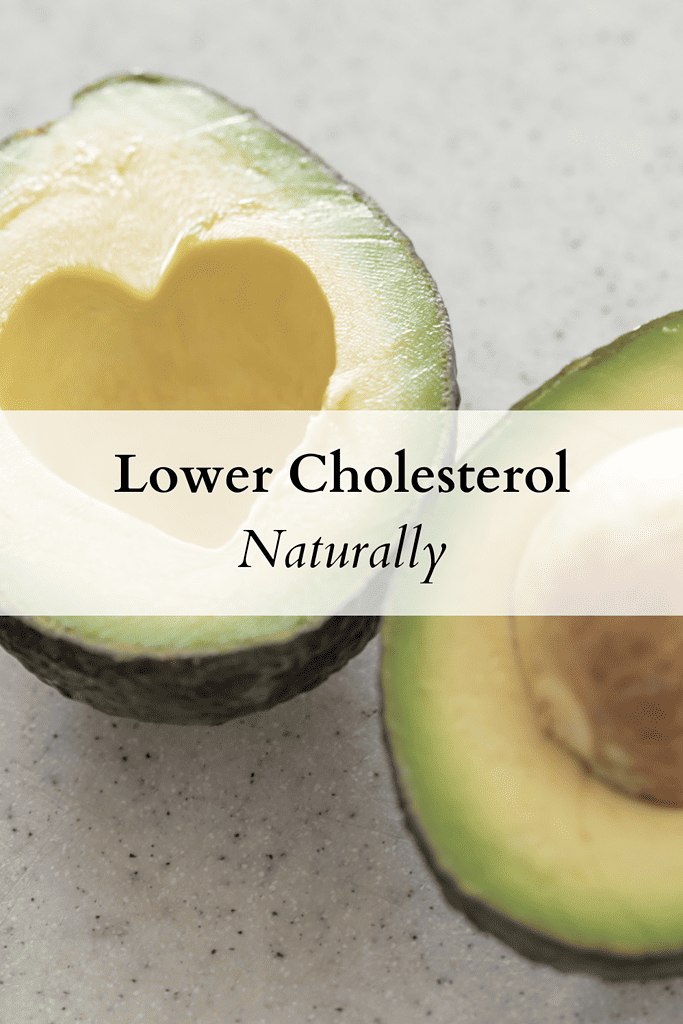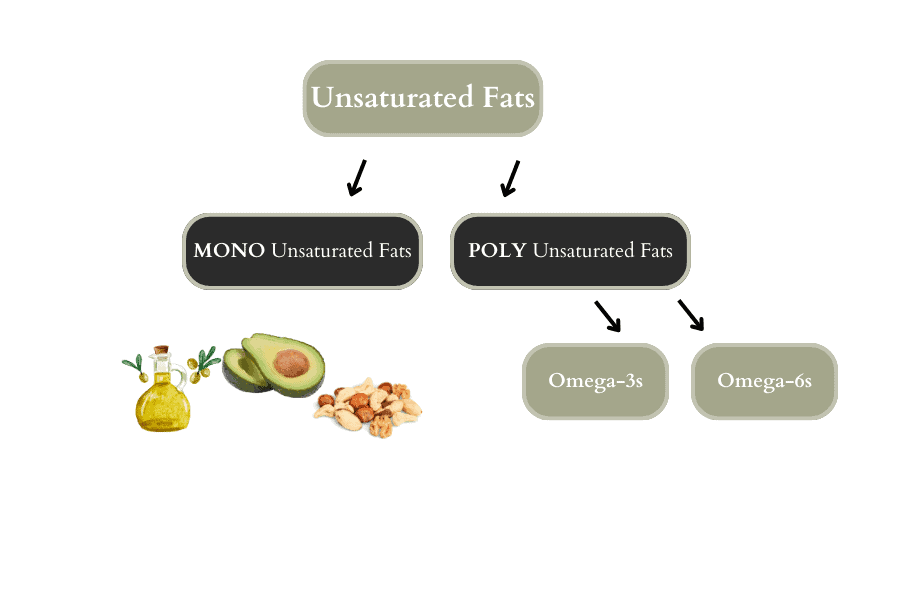How can we lower cholesterol naturally? I am asked this question daily by my clients, and the unfortunate truth is that sometimes medication is needed. However, with the right motivation and support, there is potential to make considerable improvements to your cholesterol levels through diet.
This post is all about how you can lower cholesterol naturally through diet.

There are many dietary changes you can make to lower your cholesterol. However, often, people get too carried away at the beginning and try to make too many changes to their diet. The result? They only stick to a few of these changes for a short time.
So today, in this post, I will reveal the one significant change you need to focus on to lower cholesterol naturally.
If you are more of a visual learner, you can check out my YouTube video on how to lower cholesterol naturally linked below.
The #1 Dietary Cause Of High Cholesterol
The #1 contributor to elevated cholesterol in our diet is saturated fat. It's not cholesterol!
Where Do We Get Saturated Fat?
We get saturated fat in our diet from:
- Takeaways
- Eating out
- Processed and packaged foods
- Non-lean meat, e.g. beef, pork, lamb
- The skin on poultry
- The visible fat on meat
- Cakes, biscuits, pastries
- Butter and cream
- Tropical oils, e.g. coconut oil
In today's world, many of us are over-consuming processed and packaged foods and dining out is no longer a novelty! Going to a restaurant or getting a takeaway was a big treat when I was younger. Now, these pleasures form part of our daily routines. With low-budget diners at most corners and apps like Uber Eats & Deliveroo, it has never been easier to over-consume these foods.
Chefs and food companies are not concerned about our heart health; this is why these convenience foods are so delicious! They often add plenty of saturated fat to make us want to return for seconds!
Related Post: Dietitian Explains: How To Understand Your Cholesterol Levels and WHY You NEED To Know This
What About The Saturated Fat From Dairy?
Years ago, we used to think the saturated fat from milk, yoghurt and cheese was harmful to our heart health. This was very tough news for all the cheese lovers in the world. But thankfully, recent research has shown otherwise. The other nutrients in these dairy foods (calcium, potassium and phosphate) have a protective effect on the heart and counteract the saturated fat.
Although most dietary guidelines will still recommend opting for the low-fat varieties of dairy, I don't tell my clients to worry too much about it.
If this is a topic you are interested in learning more about, check out my YouTube video below. In this video I breakdown all of the myths surrounding dairy.
Cholesterol Lowering Recipes
If you are looking for cholesterol-lowering recipes, I highly recommend the Low Cholesterol Cookbook, which is available here on Amazon. I use it regularly as the recipes are simple and easy to follow. The book is written by other dietitian’s so you can trust it’s evidence-based.
What To Replace Saturated Fat With?
So, we have established that reducing your saturated fat intake can positively impact your cholesterol levels. However, what do we replace it with? It is unlikely to improve our overall health if we replace it with the wrong foods, e.g., added and refined sugars.
And The Answer is...Unsaturated Fat
When we look at some of the healthiest people in the world, like the blue zones and the Mediterranean, they eat a LOT of fat, but it's the UNSATURATED or more heart-friendly fats.
Examples of these include:
- avocados
- olives
- olive oil
- tapenade
- rapeseed oil
- pesto
- hummus
- nuts & seeds
- oily fish
This is GREAT NEWS. We don't need to avoid these foods. Quite the opposite, they can be VERY good for your cholesterol.
Now, unsaturated fats are further broken down into MONO and POLY unsaturated fats.
Monounsaturated fats are found in olive oils, avocados and tree nuts; we should include a source of these daily.
Polyunsaturated fat is further broken down into omega 3s and omega 6s.
POLYUNSATURATED FAT HAS THE STRONGEST LOWERING EFFECT ON BAD LDL CHOLESTEROL
Omega-3s
I want to draw your attention in particular to omega 3s because there is a HUGE body of research supporting the role of omega three fats in better heart health.
They can:
- Increase our good HDL cholesterol.
- Reduce the bad LDL cholesterol
- Lower inflammation
So it's a win, win, win situation!
We primarily get omega-3 three fats from oily fish. Oily fish are usually coloured fish, so think salmon, mackerel, trout, sardines and herring. We want to get two servings of oily fish a week to get enough omega-3s.
Can I Take An Omega-3 Supplement?
This is a very valid question as many people do not like fish or don't eat it very often. There has been a lot of research into omega-3 supplements and heart health. Unfortunately, though, the evidence shows that the benefit comes from the fish.
If your fish intake is poor, I do recommend to clients that there is no harm in taking an omega-3 supplement, but eating fish is the ideal option.
What About Plant Sources Of Omega-3s?
We can get some omega-3 fats in plant-based foods (chia seeds, walnuts and flaxseeds), but it's important to say that the plant-based Omega-3 is a different type of Omega-3 three to the one in oily fish. So, in oily fish, we get DHA and EPA, and they're the ones that have all the heart-healthy benefits. In our plant-based sources of Omega-3, we have a different type of Omega-3 called ALA, which doesn't have the same benefits. If you can include the oily fish once or twice a week, that is ideal.
Vegan Sources Of Omega-3
If you are a vegan, you can still get these beneficial omega 3s from a supplement. But make sure you are choosing a supplement sourced from Algae, as this will have the EPA and DHA we are looking out for. Do not choose an omega-3 supplement from flaxseeds.
Top Tips to Lower Saturated Fat in Your Diet
- Avoid eating out frequently, as restaurant meals often contain high levels of unhealthy ingredients.
- Minimise the consumption of processed and packaged foods, as they tend to be high in additives, preservatives, and unhealthy fats.
- Limit the intake of non-lean meats like beef, pork, and lamb, as they are typically higher in saturated fats.
- Remove the skin from poultry before consuming, as it contains a significant amount of fat.
- Trim the visible fat from meat to reduce the amount of unhealthy fats in your meal.
- Reduce the consumption of cakes, biscuits, and pastries, as they are usually high in sugar, unhealthy fats, and refined carbohydrates.
- Use butter and cream sparingly, as they are rich in saturated fats that can contribute to cardiovascular health issues.
- Limit the use of tropical oils like coconut oil, as they are high in saturated fats and may affect your cholesterol levels.
If you enjoyed this post, you should check out my last posts, where I break down how to understand your cholesterol levels. This is very important information to know!
More about the author:
Hi there! My name is Maria, and I am a Registered Dietitian practicing in Ireland and Bermuda. I have extensive experience in helping clients lower their cholesterol levels through dietary interventions. I hope you found the article informative and beneficial. If you have any questions or concerns, please do not hesitate to contact me. Additionally, if there are any other topics related to nutrition that you would like me to cover in my upcoming articles, please let me know. I would be more than happy to help.
Stay happy and healthy 💚
Your Registered Dietitian
Maria xox







Leave a Reply